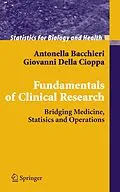The scope of clinical research is to evaluate the effect of a treatment on the evolution of a disease in the human species. In recent years many introductory textbooks on clinical trial methodology have been published, some of which are excellent, in addition to a very extensive specialist literature. Here is a new book on methods and issues in clinical research. Its objectives can be summarized in three points. 1. Integrate medical and statistical components of clinical research. 2. Do justice to the operational and practical requirements of clinical research. 3. Give space to the ethical implications of methodological issues in clinical research. The book ends with a brief description of the drug development process and the phases of clinical development.
Zusammenfassung
Statistical methodology is an essential component of clinical (and biological) - search. Therefore it is not surprising that many textbooks aiming at explaining statistical methods to researchers have been published and continue to appear in print. The complexity of the basic issue, that of communication between st- isticians and researchers, is illustrated and discussed very well by the authors of this book in their Introduction. Thus it would be of no benefit to dwell further on this theme and on the difficulty of producing truly effective material. I prefer to start from a personal episode. Way back in 1959, a freshman of the faculty of Statistical Sciences, I found by chance on a stand, the book Metodi statistici ad uso dei ricercatori, which was the Italian translation of the famous book by RA Fisher. The textbook for the first course of statistics used that year at of our University had left me perplexed. A student like myself, with a good high school scientific education, was fascinated by the wealth of real life ex- ples, but was unable to reconstruct the thread of logical-mathematical reas- ing, especially the inductive one. The unexpected access to Fisher's legendary book raised my hopes that I could finally get to the heart of the matter.
Inhalt
Viability of Biological Phenomena and Measurement Errors.- Distinctive Aspects of a Biomedical Study Observational and Experimental Studies.- Observational Studies.- Defining the Treatment Effect.- Probability, Inference and Decision Making.- The Choice of the Sample.- The Choice of Treatments.- Experimental Design: Fallacy of Before-After Comparisons in Uncontrolled Studies.- Experimental Design: the Randomized Blinded Study as an Instrument to Reduce Bias.- Experimental Designs.- Study Variants Applicable to More than One Type of Design: Equivalence Studies, Interim Analyses, Adaptive Plans and Repeated Measurements.- The Drug Development Process and the Phases of Clinical Research.
